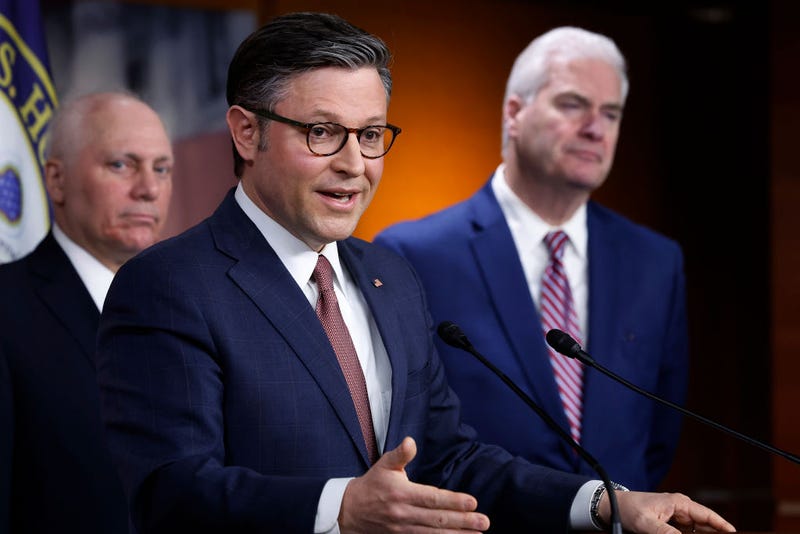
Congressional leaders on Thursday unveiled a $1.2 trillion spending package to avoid a partial government shutdown that would hit as midnight strikes on Friday.
The biggest portion of the six-bill measure includes $825 billion for the Defense Department, a $27 billion increase from last year. The other five bills keep funding levels relatively the same for the departments of Homeland Security, Labor, Health and Human Services, Education, and State; financial services and general government; and legislative branch.
"Given that the world is becoming more dangerous, we wanted to send a strong message that we will do everything in our power to protect the American people and defend our interests," House Appropriations Chairwoman Kay Granger (R-TX) said in a statement. "This bill funds our highest national security priorities - it invests in a more modern, innovative, and ready fighting force, continues our strong support for our great ally Israel, and provides key border enforcement resources."
Highlights of funding for Defense:
• Funds the largest increase (5.2%) in basic military pay in over 20 years
• Provides a $27 billion increase over the previous budget, and directs that funding to critical national defense efforts, including countering China, increasing counternarcotics efforts, and investing in quality-of-life initiatives for servicemembers and their families.
• Maxes out production of critical munitions.
• Doubles security cooperation funding for Taiwan.
• Invests in next-generation fighter aircraft, helicopters, tactical combat vehicles, and submarines.
Sen. Patty Murray (D-WA), chair of the Senate Appropriations Committee, said in a statement the $1.2 trillion funding package also protects and strengthens the "investments that matter most in people's daily lives." Among other things, she said it lowers child care costs for families and strengthens Head Start with a new $1 billion investment to help families in every zip code afford child care.
Highlights of funding for Labor, Health and Human Services, Education, and Related Agencies:
• Provides $222.2 billion in base discretionary funding, including $13.4 billion for the Department of Labor, $116.8 billion for HHS, $79.1 billion for Education, and $14.2 billion for the Social Security Administration's administrative expenses.
• Supports basic biomedical research investigating new treatments and cures for cancers, Alzheimer's disease and other chronic and rare diseases.
• Targets resources to rural communities, including vital telehealth and opioid response resources.
• Invests in students at every stage by delivering resources for public K-12 schools, Pell Grants and more.
Highlights of funding for Financial Services and General Government:
• Provides $26.7 billion to fund the operations of the Department of the Treasury, the Executive Office of the President, the federal judiciary, the District of Columbia, the Small Business Administration, and more than two dozen independent federal agencies.
• Delivers resources to maintain essential government functions, support small businesses, protect Americans' bank accounts and more.
• Includes $12.3 billion for the IRS to carry out its responsibilities and continue renewed efforts to improve customer service sand replace antiquated
computer systems.
• Prevents the Consumer Product Safety Commission's recent efforts to ban gas stoves.
Highlights of funding for Homeland Security:
• Provides $61.8 billion in total discretionary funding, including new funding to stop the flow of fentanyl and continued support for the refugee resettlement program.
• Funds 22,000 Border Patrol Agents, the highest level ever funded.
• Increases detention bed levels to 41,500.
• Increases funding for new border security technology, and invests in cutting-edge technology like Autonomous Security Towers, cross-border tunnel detection, and Non-Intrusive Inspection equipment to detect fentanyl.
Highlights of funding for Legislative Branch:
• Provides $6.75 billion for the operations of the Senate and House of
Representatives, Capitol Police, Library of Congress, Government Accountability Office, Copyright Office, Congressional Research Service, Congressional Budget Office, Architect of the Capitol and Office of the Attending Physician.
Highlights of funding for State, Foreign Operations, and Related Programs:
• Provides $58.346 billion in total funding for the Department of State, Agency for International Development, and other essential related programs.
• Prioritizes funding to counter the People's Republic of China, including $300 million in Foreign Military Financing for Taiwan.
• Authorizes an additional 12,000 Special Immigrant Visas for Afghans who assisted the U.S. government during the war in Afghanistan.
• Increases base funding for humanitarian assistance to support efforts to provide emergency food, shelter, water, and basic services to populations caught in conflict and crises across the globe.
